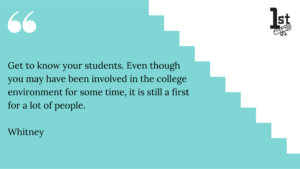First-Generation Students

Defining “First-Generation” Student
First-generation learners are a diverse group; it can be challenging to define such a group in a simple way.
RU First, a Rutgers–New Brunswick unit that supports first-generation learners, defines first-generation learners as students with “neither parent having received a four-year college degree” or “any student who may self-identify as not having prior exposure to or knowledge of an experience like Rutgers and may find having resources to assist in the transition helpful.”
This definition of “first generation” is more inclusive of learners who may not neatly fall into the “first in their family to attain a 4-year college degree” definition, but who may experience college in similar ways—for example, a student with an estranged parent who attained a college degree, or a student with a parent who attained a 4-year degree in another country and in another language.
Likewise, there is a wide degree of variation among those who are considered “continuing-generation” learners (i.e. learners who have at least one parent attain a 4-year college degree). For example, a student whose parents received advanced degrees and work within the higher education space may experience college quite differently from a student with one parent who completed college and then went on to work in an occupation that does not require a college degree.
FirstGen Forward, an initiative of the National Association of Student Personnel Administrators (NASPA) and the Sudar Foundation, provides a nuanced discussion of “first-generation college students”.
Learn More About First-Generation Students
-
These Rutgers resources provide information about first-generation learners at Rutgers. The first two include services specifically for first-generation learners; consider including these links within your syllabus or through course communications to increase awareness and encourage their use.
Rutgers Undergraduate Admissions | Information for First Generation Students
This page provides information on first-generation learners at each of the Rutgers campuses, as well as information on programs and services that “are specifically designed to increase the retention and graduation rates of students who are first-generation, low-income, and/or have disabilities.”
RU1ST supports first-generation learner success at Rutgers–New Brunswick. This page provides FAQs for first-generation learners, including resources specifically for transfer and international students. “RU1ST provides an opportunity for Rutgers to increase awareness about the experiences of first-generation college students and to share knowledge and best practices for first-generation college student success.”
Rutgers Today | Celebrating the Success of Our First-Generation Students
This Rutgers Today article provides information on the numbers of first-generation learners at Rutgers and profiles first-generation students from each Rutgers campus. “Across Rutgers, about 18,000 undergraduates – 37 percent of the entire student body – are first-generation, according to the most recent statistics available.”
-
These resources provide useful background information and statistics on first-generation students nationally.
Postsecondary National Policy Institute
First Generation Students in Higher Education Fact Sheet
FirstGen Forward | Center for First Generation Student Success
FirstGen Forward, an initiative of NASPA and the Sudar Foundation, provides a series of fact sheets that detail statistics of first-generation and continuing-education learners nationally:
Demographic Characteristics and Postsecondary Enrollment
First Year Experience, Persistence, and Attainment
Use of Student Services among Freshman
First-generation College Students’ Employment
First-generation College Students’ Achievement and Federal Student Loan Repayment
Forbes Advisor
56% Of All Undergraduates Are First-Generation College Students
This site summarizes and highlights statistics about first generation learners nationally.